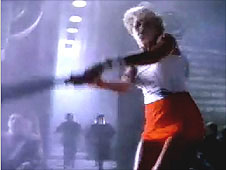‘YOU WILL SEE WHY 1984 WILL NOT BE LIKE 1984’
‘With more than a nod to George Orwell’s novel 1984,the advert warned of a future where soulless drones unquestionably soak up the words of their dictator who speaks to them from a large screen. Moments later a gorgeous nameless heroine in red shorts and a white tank top comes running down the aisle with a hammer in her hands while apparently being chased by the thought police.
She hurls the hammer at the screen just as “Big Brother” is telling the faithful “we shall prevail.” ‘
I’m still waiting.
WSJ 2003 Michael Gonzalez:
‘The BBC has been described as Orwellian, because of its unequaled role in shaping perceptions in Britain. This is one reason the government of Tony Blair has taken the broadcaster to task over its biased coverage of the Iraq war and its aftermath. But George Orwell also warned us about the dangers the BBC presents in other important ways.
Orwell recognized that Britain’s chattering classes have a suicidal habit of flirting with appeasement. Other great British thinkers have also seen this–not least those who, despite having a healthy mistrust of nationalism, realized that an elite estranged from feelings of patriotism represented a threat.
That the BBC has become the home to this elite today is a tough judgment to pass, and the BBC does many great things. Its non-news documentaries are excellent and its comedies – from “Fawlty Towers” through “Blackadder” to, most recently, “The Office” – are brilliant in a way that few American sitcoms dare to be.
Still, it is important not to close one’s eyes to what else the BBC has become, particularly since the corporation and its journalists are themselves blind to it. The BBC refuses to admit that its coverage of the lead-up to war, of the conflict and its aftermath, has been tendentious; that it has relentlessly pushed the agenda that the war was wrong. The last straw was its claim that, against the wishes of the intelligence agencies, the government had inserted into a dossier on Iraq the assertion that Saddam Hussein had the ability to deploy weapons of mass destruction in 45 minutes.
The BBC’s Andrew Gilligan quoted a source – who turned out to be the scientist David Kelly – as criticizing the government. Kelly later refuted how his comments had been portrayed by Mr. Gilligan to a parliamentary committee. Then Kelly committed suicide. Now the BBC has to either admit that it misquoted a mourned scientist or call him a liar.
That’s the scandal in a nutshell. What led to it is the BBC’s all-out campaign to validate its world view. Because the mass graves and accounts of torture by Saddam’s regime are too real, the BBC has grabbed onto the fact that WMDs have not yet been found to justify its animosity toward the liberation of Iraq. And this animus sprang from the consensus that the West is always wrong.
As Conrad Black, owner of the Telegraph newspapers, wrote in a letter in the July 26 Daily Telegraph: “The BBC is pathologically hostile to the government and official opposition, most British institutions, American policy in almost every field, Israel, moderation in Ireland, all Western religions, and most manifestations of the free market economy.”
Lord Black added: “Though its best programming in non-political areas is distinguished, sadly it has become the greatest menace facing the country it was founded to serve and inform.”
This is not hyperbole. The BBC can be a formidable foe. It has, in its own words, “the most widely watched national news bulletins in the UK.” Thus when the BBC decides to manufacture a story, or ignore another, it forms reality for millions in Britain and world-wide. It gave a demonstration of its muscle July 25, when it ran (and ran) with a scoop that Mr. Blair’s director of communications, Alastair Campbell, was about to quit because of the Kelly scandal. That dominated headlines for days.
Mr. Campbell is a powerful man, and his imminent departure would be news. But his resignation (still to be confirmed) also validated the BBC’s position. Also news, however, was the fact that the same day as the Campbell scoop the BBC had changed its mind and requested that Parliament not reveal testimony Mr. Gilligan had given on the scandal. In telling contrast, the evening’s bulletin did not report these facts.
Quite how the BBC’s news department got to this juncture is difficult to parse. Journalists are overwhelmingly left of center to begin with. But there’s more to it than that. BBC journalists are part of the self-appointed elite. In London, home of the global avant-garde, they imbibe the latest anti-Western ideologies and platitudes at the dinner parties where they sup.
No man was better than Orwell at diagnosing the ills that have led to the state of affairs that Lord Black so eloquently describes. In “Notes,” Orwell wrote: “In societies such as ours, it is unusual for anyone describable as an intellectual to feel a very deep attachment to his own country. Public opinion – that is, the section of public opinion of which he as an intellectual is aware – will not allow him to do so. Most of the people surrounding him are skeptical and disaffected, and he may adopt the same attitude from imitativeness or sheer cowardice.”
Through its declarations the BBC reveals itself to be unaware that some people think of it in this manner, let alone that it might be true. It is a testament to Britain’s genius that time and again heroes have emerged from unlikely places to slay the nihilism of the intelligentsia. Whether there are any out there to battle with it today remains to be seen.’




